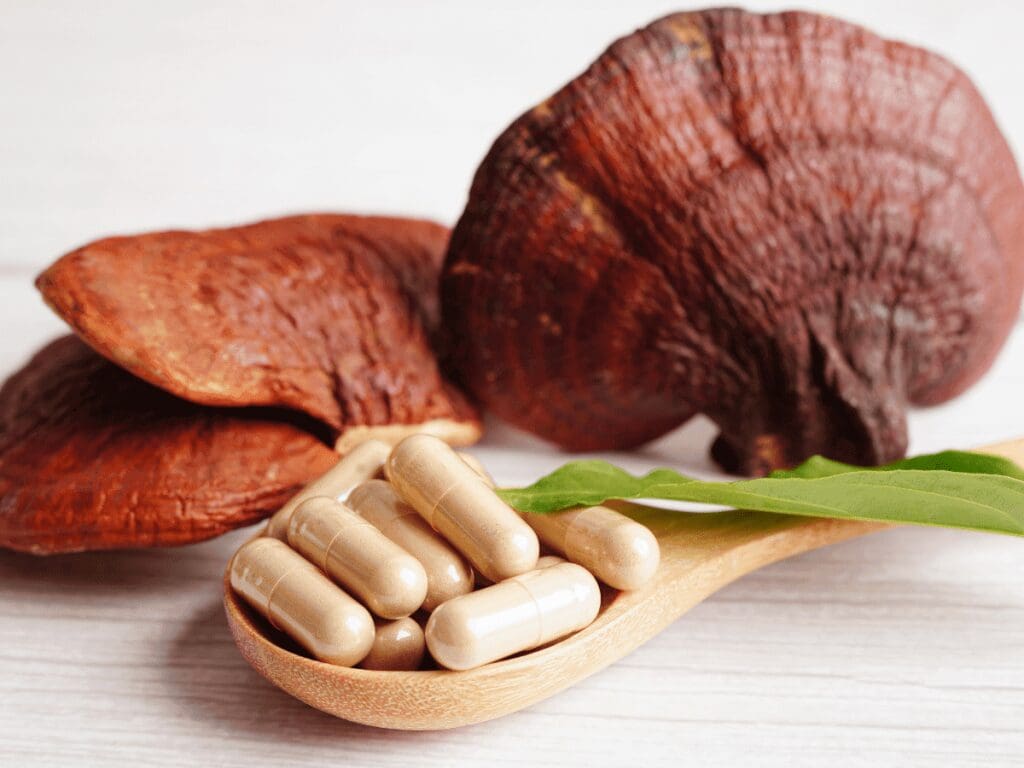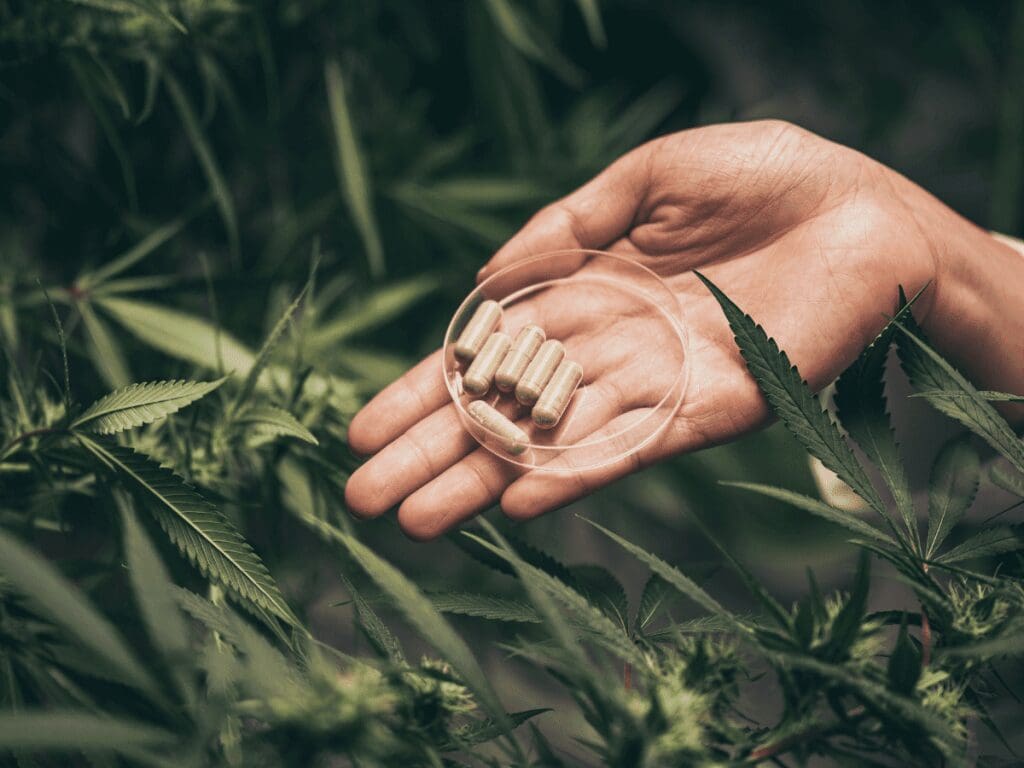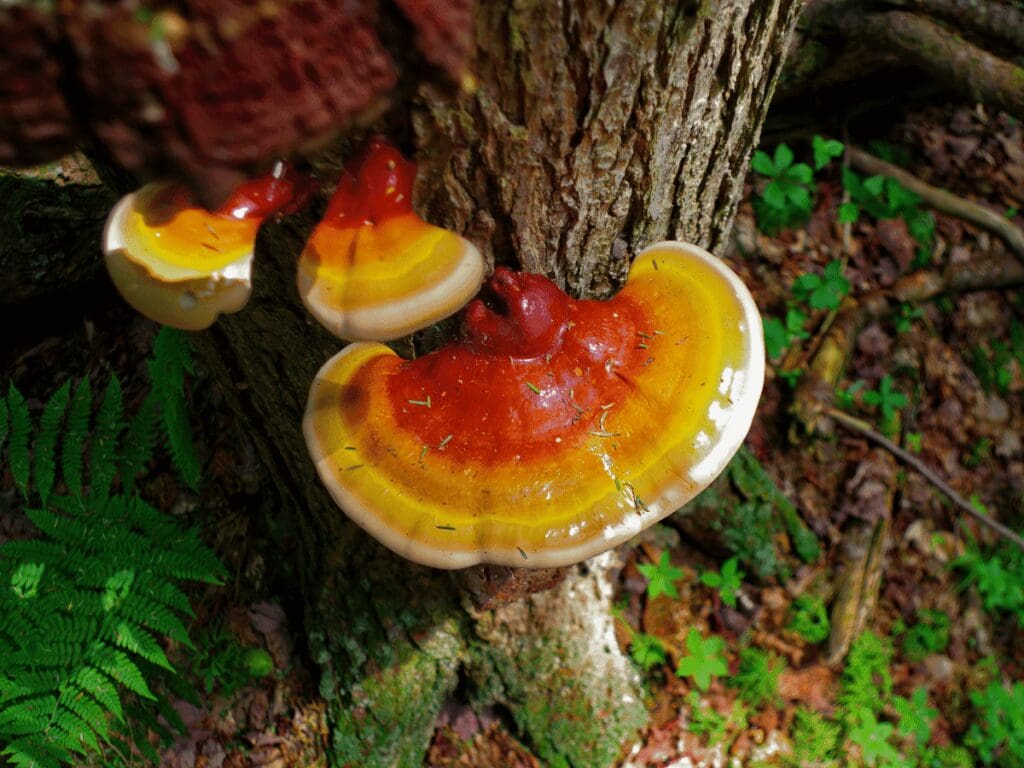Key Takeaways:
- Immune System Support: Reishi mushrooms contain polysaccharides, triterpenoids, and beta-glucans which collectively enhance immune cell activity and support overall immune health.
- Anti-Inflammatory Benefits: Reishi mushrooms offer significant anti-inflammatory properties through compounds like triterpenes, helping to mitigate chronic inflammation and associated health risks.
- Versatile Usage in Wellness: Reishi can be easily incorporated into daily routines through supplements, teas, or cooking, providing flexibility in how individuals can enjoy its health benefits.
As a leading authority on natural wellness solutions, Happy Hemp is proud to explore the remarkable properties of reishi mushrooms, a superfood with a legacy dating back thousands of years in Eastern medicine. These powerful fungi are celebrated not only for their historical significance but also for their emerging role in modern health practices, as they are increasingly validated by scientific research. Renowned for their immunity-boosting and anti-inflammatory effects, reishi mushrooms stand at the crossroads of ancient wisdom and contemporary health, epitomizing the synergy of nature and science.
In this article, we will explore the multitude of health benefits that reishi mushrooms have to offer. We’ll uncover the potential of reishi mushrooms in everyday well-being and provide insight into how incorporating reishi into your holistic health regimen can bolster immunity, combat inflammation, and enhance overall wellness. Join us as we examine reishi mushrooms and its impact on our current lifestyle.
While reishi is a valuable addition to your health routine, don’t miss out on exploring the variety of benefits that other functional mushrooms can provide. Happy Hemp’s Mushroom Gummies are a great way to enjoy a broad spectrum of mushroom benefits.
The Immune-Boosting Power Of Reishi Mushrooms
Understanding Immunity
The immune system is a complex network of cells, tissues, and organs that collaboratively defend the body against infections and diseases. It identifies and neutralizes harmful pathogens such as viruses, bacteria, and parasites. Essential components like white blood cells, antibodies, and the lymphatic system play important roles in this protective function. Maintaining a robust immune system is crucial for overall health. It effectively prevents a multitude of illnesses, providing a fundamental barrier to many infectious diseases.
Key Immune-Boosting Compounds In Reishi Mushrooms
Reishi mushrooms are packed with several bioactive compounds that significantly boost the immune system. These compounds not only support the body’s natural defenses but also provide broad-spectrum health benefits. Here’s a closer look at the key immune-boosting components found in reishi mushrooms:
- Polysaccharides: These are complex carbohydrates that stimulate the production of immune cells like macrophages and natural killer cells. Polysaccharides in reishi help improve the body’s response to infections and can even enhance the efficacy of vaccines by acting as biological response modifiers.
- Triterpenoids: Triterpenoids in reishi mushrooms help reduce chronic inflammation and inhibit histamine release, which is beneficial for allergic reactions. These compounds also enhance the body’s adaptogenic response, helping to balance out immune system activity and prevent autoimmune complications.
- Beta-Glucans: Beta-glucans strengthen the immune system by activating white blood cells, which are essential for fighting off pathogens. Their role is crucial in preventing infections and has been linked to improved outcomes in fighting cancer, reducing the recurrence of cancer cells, and promoting overall immune resilience.
These compounds together create a potent combination that not only boosts immune health but also provides a protective effect against a variety of ailments. By activating and regulating the immune system, reishi mushrooms serve as a natural aid for maintaining health and preventing disease.
Real-Life Benefits
Individuals who regularly consume reishi mushroom supplements often report a range of health improvements. Common benefits include fewer occurrences of common illnesses such as colds and flu. Other reported benefits are increased energy levels and better stress management, possibly linked to the adaptogenic properties of reishi. While anecdotal evidence such as personal testimonials should be viewed with caution, they do align with research suggesting that reishi mushrooms can significantly impact immune health and general well-being.
How Reishi Mushrooms Help Fight Inflammation
The Nature Of Inflammation
Inflammation is a natural response of the body’s immune system to injury or infection, characterized by redness, swelling, heat, and sometimes pain. While acute inflammation is beneficial and necessary for healing, chronic inflammation can lead to numerous health issues, including arthritis, heart disease, and various autoimmune disorders. Understanding how to control and mitigate chronic inflammation is crucial for maintaining long-term health and preventing these conditions.
Anti-Inflammatory Agents In Reishi Mushrooms
Reishi mushrooms contain several potent anti-inflammatory compounds that can help reduce chronic inflammation and alleviate associated symptoms. The most notable of these are the triterpenes, which have been shown to inhibit the production of pro-inflammatory cytokines and prevent oxidative stress within the body. These effects can help lower the risk of chronic inflammatory diseases and promote overall health.
Studies And Evidence Supporting Reishi’s Anti-Inflammatory Effects
Numerous studies have explored the anti-inflammatory properties of reishi mushrooms, with many confirming their beneficial impacts. Research indicates that reishi can effectively reduce inflammation markers in both the blood and tissues. For example, clinical trials have demonstrated that reishi extracts can significantly improve symptoms in patients with rheumatoid arthritis, a chronic inflammatory disease, by reducing inflammation and pain.
Additional Health Benefits Of Reishi Mushrooms
Supporting Heart Health
Reishi mushrooms are also known for their cardiovascular benefits. Studies have shown that they can help lower blood pressure, reduce cholesterol levels, and prevent the buildup of plaque in arteries, which are major risk factors for heart disease. The triterpenoids in reishi have been found to improve blood circulation and stabilize blood sugar levels, further supporting heart health and reducing the risk of heart attacks and strokes.
Potential Anti-Cancer Properties
Compounds in reishi, such as polysaccharides and triterpenoids, have been studied for their ability to inhibit tumor growth and prevent the spread of cancer cells. These compounds can induce apoptosis (programmed cell death) in cancerous cells and enhance the activity of the body’s natural killer cells, offering a dual approach to cancer prevention and therapy.
Effects On Blood Sugar And Cholesterol
Reishi mushrooms may offer benefits for those managing diabetes and high cholesterol. The mushrooms have been shown to help regulate blood sugar levels by improving insulin resistance and promoting insulin release. Additionally, they can help lower cholesterol levels by influencing how the body processes fats and cholesterol, potentially reducing the risk of developing cardiovascular diseases.
Incorporating Reishi Mushrooms Into Your Wellness Routine
Dietary Supplements
One of the most convenient ways to include reishi mushrooms in your health regimen is through dietary supplements, available in capsule or powder form. These supplements often contain a concentrated dose of reishi extract, making it easier to achieve the desired health benefits without the need to consume large amounts of the mushroom itself. It’s important to choose high-quality products from reputable suppliers to ensure you’re getting a pure and potent supplement.

Reishi In Traditional And Herbal Teas
Traditional and herbal teas are another popular method for enjoying the health benefits of reishi, offering a soothing, therapeutic experience. The mushrooms are typically dried, sliced, or powdered and then steeped in hot water to make a medicinal brew. This method not only extracts the beneficial compounds but also makes them easy to digest.
Creative Recipes For Everyday Cooking
For those who enjoy cooking, reishi mushrooms can be incorporated into various recipes. While fresh reishi can be bitter, careful preparation and cooking can mitigate this flavor, making it a nutritious addition to soups, stews, and broths. Powdered reishi can also be added to smoothies, baked goods, and even coffee blends to enhance their nutritional profile.
The Science Behind Reishi Mushrooms
Overview Of Current Scientific Studies
Research on Reishi mushroom spans from laboratory tests and animal studies to controlled human clinical trials. These studies primarily focus on reishi’s immune-boosting, anti-inflammatory, and anticancer effects. Scientific findings often support traditional uses, highlighting the mushroom’s potential in boosting overall health and combating chronic diseases.
Analysis Of Clinical Trials And Outcomes
Clinical studies on patients with hypertension have shown that reishi can help lower blood pressure safely. Other trials have focused on its anti-inflammatory properties, showing significant reductions in markers of inflammation in participants. These outcomes not only validate some of the traditional claims but also open the door to potential new uses in Western medicine.
Criticisms And Limitations Of The Research
Despite the positive outcomes, the scientific study of reishi mushrooms is not without its criticisms and limitations. Some studies have been small-scale or lack the rigor of larger randomized controlled trials, which can affect the reliability of the results. Additionally, variations in the preparation and dosage of reishi mushroom products can lead to inconsistent results across different studies. Researchers continue to call for more standardized and comprehensive studies to better understand the full range of reishi’s health benefits.
Comparing Reishi Mushrooms With Other Superfoods
Reishi Vs. Turmeric
Both reishi mushrooms and turmeric are celebrated for their anti-inflammatory and immune-boosting properties. Turmeric, with its active compound curcumin, is known for its potent anti-inflammatory effects and is widely used to relieve symptoms of arthritis and other inflammatory conditions. Reishi, on the other hand, not only fights inflammation but also enhances overall immune function and has potential anticancer properties. While turmeric is often incorporated into daily cooking, reishi is typically consumed in supplement form or as a tea.
How Reishi Stacks Up Against Spirulina
Spirulina, a type of blue-green algae, is another superfood rich in nutrients such as proteins, vitamins, and minerals. It is especially known for its antioxidant properties and its ability to improve cholesterol levels and boost energy. Compared to spirulina, reishi mushrooms offer more specialized health benefits, particularly in immune modulation and the potential reduction of cancer risk. Both are valuable supplements, but their uses and benefits can vary depending on individual health needs.
The Unique Advantages Of Reishi Over Cbd
CBD, derived from hemp, is acclaimed for its ability to alleviate anxiety, pain, and inflammatory symptoms without the psychoactive effects of THC. Reishi mushrooms complement these benefits by offering additional immune system support and potential longevity benefits, which CBD does not directly affect. For individuals interested in comprehensive health improvements, combining CBD with reishi could potentially cover a broader spectrum of health benefits than either would alone.

Final Thoughts
Reishi mushrooms stand out as a powerful superfood, well-regarded not only in traditional medicine but increasingly validated by modern science. Their broad spectrum of health benefits—from enhancing immune function and fighting inflammation to potential anticancer properties—makes them a valuable addition to a holistic health regimen. While reishi can be integrated into your diet through supplements, teas, or culinary recipes, it’s important to consult with a healthcare provider to ensure it complements your health needs and current treatments.
Read also:
- Can CBD Be Given with Mushroom Supplements?
- What Are Functional Mushrooms and Adaptogens – Everything You Need to Know
- Discover the Power of Happy Hemp’s Amanita Muscaria Mushroom Gummies: A New Dimension in Natural Wellness
Frequently Asked Questions About Benefits Of Reishi Mushroom
Do reishi mushrooms improve liver health?
Yes, they support liver function by promoting detoxification and may help regenerate healthy liver cells.
What are the anti-aging effects of reishi mushrooms?
Reishi mushrooms contain antioxidants that can help slow aging by protecting cells from oxidative stress.
How do reishi mushrooms support cognitive function?
They have neuroprotective properties that might improve memory and cognitive function, potentially helping to combat neurological diseases like Alzheimer’s.
Can reishi mushrooms lower cholesterol?
Yes, components in reishi can reduce LDL (bad) cholesterol and increase HDL (good) cholesterol.
Do reishi mushrooms help with asthma?
Yes, they contain compounds that may improve asthma symptoms by acting as natural antihistamines.
What is the recommended dosage of reishi mushrooms?
Typically, a dose of about 1,000 mg of reishi extract per day is suggested, but this can vary based on the form and concentration of the product.
How long does it take for reishi mushrooms to work?
The effects of reishi mushrooms can vary by individual, and it may take a few weeks to notice the benefits.
Can reishi mushrooms be used for skincare?
Yes, their antioxidant and anti-inflammatory properties may help improve skin health.
Are there any side effects of taking reishi mushrooms?
Possible side effects include headaches, dizziness, and digestive upset, particularly with high doses or long-term use.
Can you grow reishi mushrooms at home?
Yes, reishi can be grown on logs or in blocks specially prepared with spores, though they require a moist, shaded environment to thrive.
Sources:
- Mizuno, T., Wang, G., Zhang, J., Kawagishi, H., Nishitoba, T., & Li, J. (1995). Reishi, Ganoderma lucidum and Ganoderma tsugae: bioactive substances and medicinal effects. Food Reviews International, 11(1), 151-166.
- Jin, X., Beguerie, J. R., Sze, D. M. Y., & Chan, G. C. (2012). Ganoderma lucidum (Reishi mushroom) for cancer treatment. Cochrane Database of Systematic Reviews, (6).
- Elsemelawy, S. A., Gharib, M. A., & Elhassaneen, Y. A. (2021). Reishi Mushroom (Ganoderma lucidum) Extract Ameliorate Hyperglycemia and Liver/Kidney Functions in Streptozotocin-induced Type 2 Diabetic Rats. Bulletin of the National Nutrition Institute of the Arab Republic of Egypt, 57(1), 74-107.







